
8 Dec, 2019
First Bangkok Literature festival explores future of Asia in an Age of Autocracy, Absurdity and Anger
Bangkok – If biodiversity, clean air and water, forests, wildlife, flora and fauna are important for human survival and global sustainability, what about democracy, human rights, freedom of expression, gender equality, ethnic and cultural harmony, peace and justice?
|
Should the world be equally concerned about the slow but steady destruction of both?
These questions took centre-stage as more than 30 top authors, writers, poets, film-makers, dramatists, essayists and journalists from Thailand, ASEAN, India, China, Japan, Australia, the United States and many other countries convened for the first Neilson Hays Bangkok Literature Festival held between Nov 16-17 in Bangkok.
It was designed to “connect curious minds with inspiring literary voices to ignite imaginations, foster connections, and invite critical investigations of Asia’s place in the world.”
And that’s exactly what it did. Topics such as “Revolt Or Retreat”, “Playing With Fire”, “The Politics of the Absurd,” “Creative Rebels,” and “Violence Knows No Borders” reflected the uncensored programme content. From totalitarianism in North Korea to the rise of Hindutva extremists in India and ongoing military censorship in Burma, socio-cultural tensions in South Thailand, women’s rights, discrimination against the LGBTQ community, nothing was off the table.
It was like a United Nations meeting, minus the onerous protocol and diplomatic niceties.
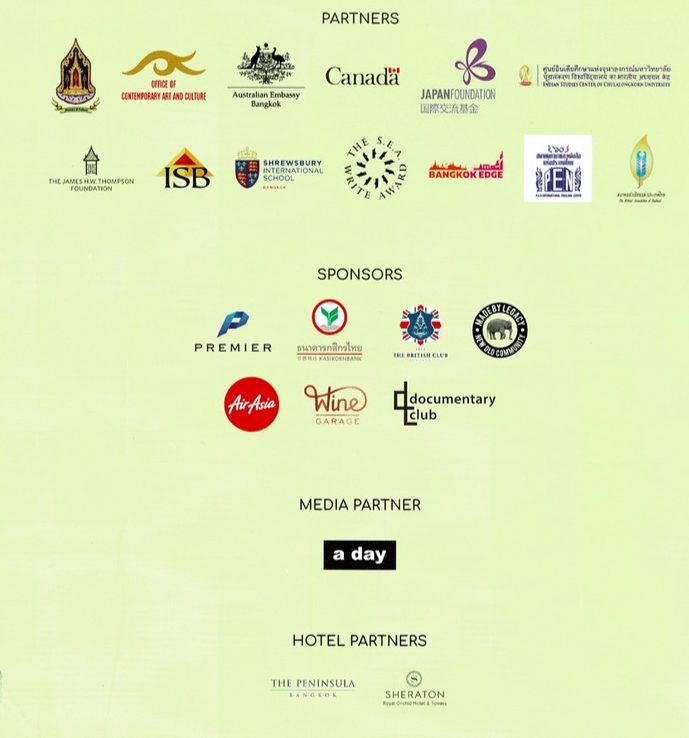
Eleven months in the planning, the inaugural event was supported by Thailand’s Office of Contemporary Art and Culture (OCAC), Ministry of Culture, and a host of other enlightened partners and sponsors who deserve to be applauded for their contribution to peaceful, reasoned debate and discussion. It marked the 150th anniversary of the Neilson Hays Library, Thailand’s oldest English-language library which claims an august collection of more than 20,000 books.
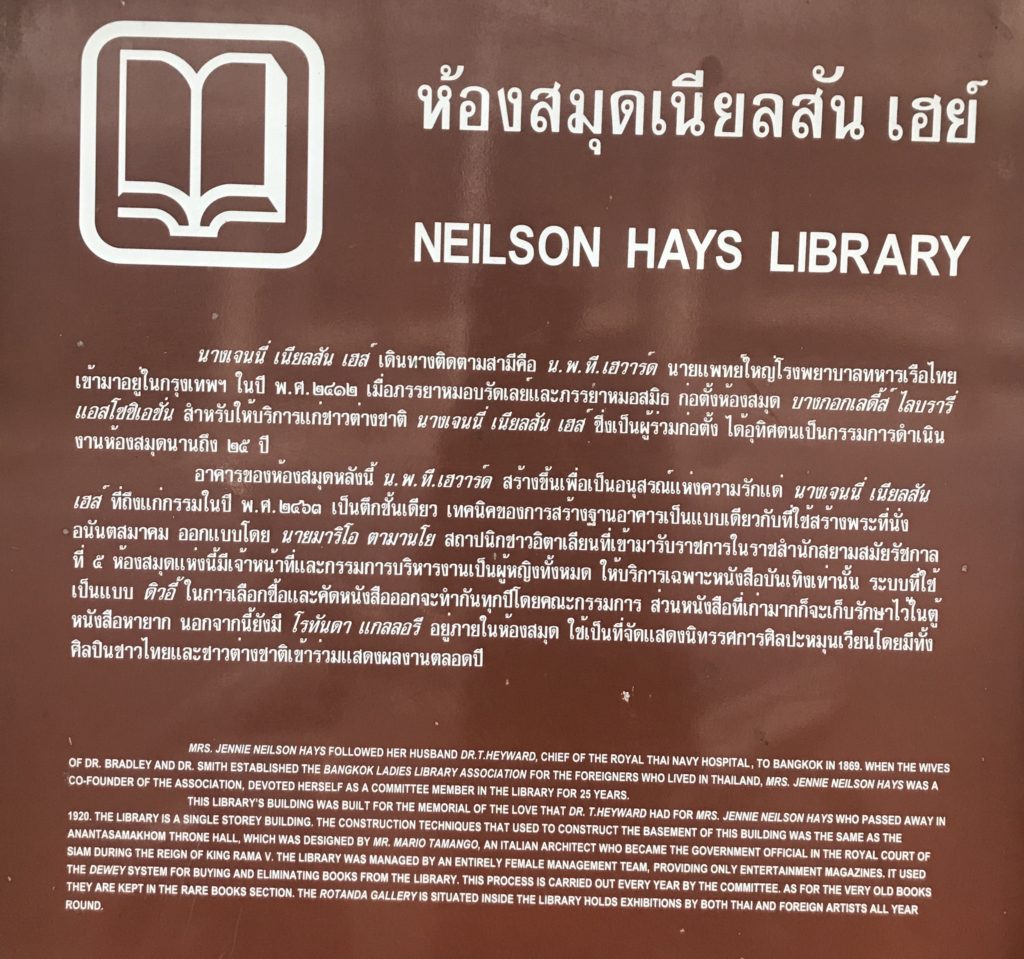
In her opening remarks Library CEO Mrs Nalin Vanasin, a Stanford-educated former corporate executive, said the objective of the Literature Festival was in line with the central mission of the Library, viz., to serve the community, foster learning and encourage intellectual discussion, “all of which are under threat in a world of social media.” She hoped it would be a “celebration of learning and reading not just for a weekend but a lifetime to come.”
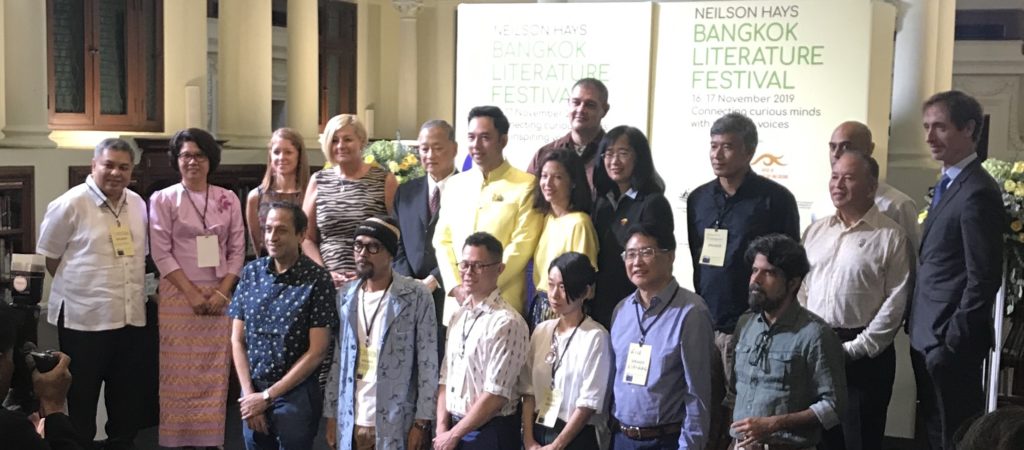
Opening speakers, partners and some of the writers and poets at the opening. Pix: Imtiaz Muqbil
Thai Minister of Culture Mr. Sontaya Khunpluem said he had last visited the historic library 20 years ago as a student at Chulalongkorn university. He said the Ministry was happy to support the event’s objectives in an era when Thais prefer to do their reading and searching on their smartphones rather than in libraries.
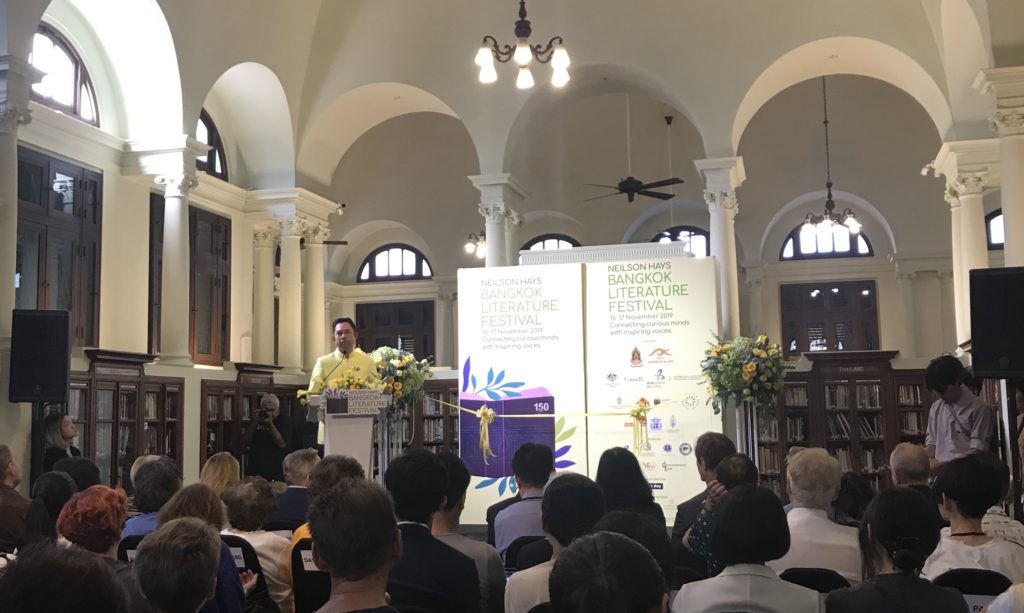
Minister of Culture Sontaya Khunpluem. Pix: Imtiaz Muqbil
Former Bangkok Governor Mr. Sukhumbhand Paribatra said he hoped the event would encourage and inspire future generations to “read more, learn more and gain greater wisdom and knowledge.” In his capacity as Chairman of S.E.A. Write Award for two decades, he said he was pleased to see seven past award winners on the list of speakers.
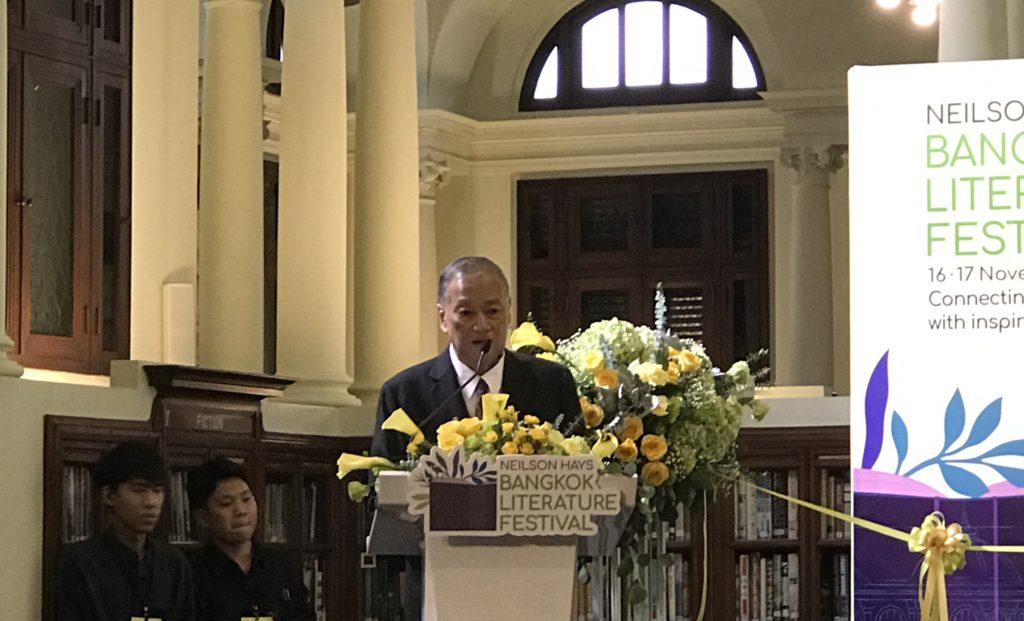
Chairman of the S.E.A. Write Award Sukhumbhand Paribatra. Pix: Imtiaz Muqbil
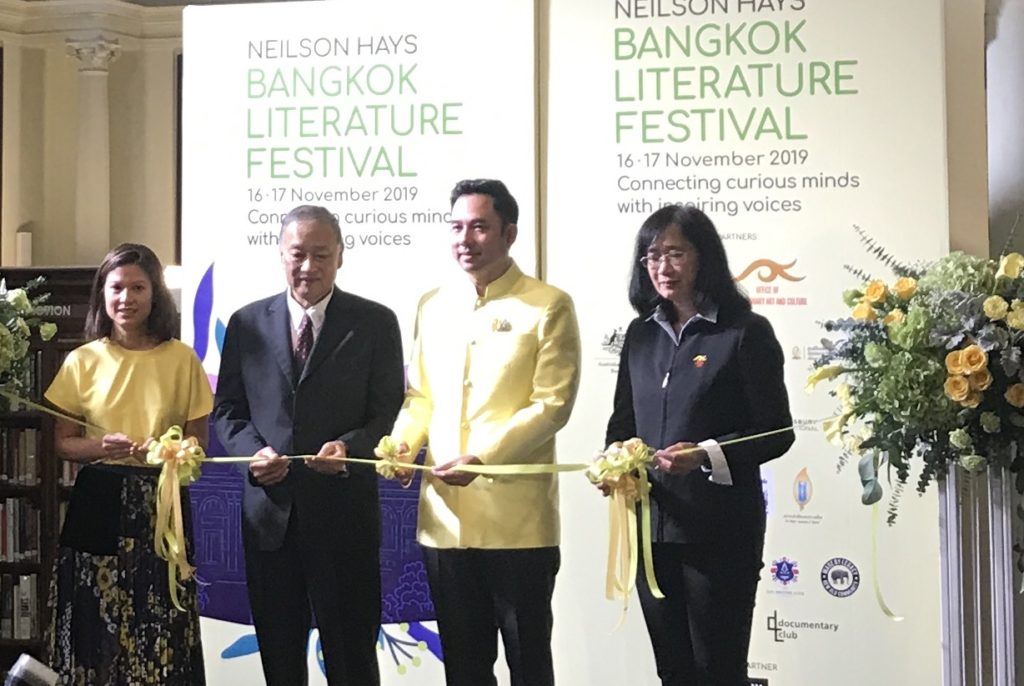
The ribbon-cutting. Neilson Hays Library CEO Nalin Vanasin is on the left. Pix: Imtiaz Muqbil
The opening panel of the theme of “Revolt or Retreat”, set the ball rolling with a comprehensive exploration of how “writers react to oppression and suppression in all its forms.”
Moderator Nisid Hajari, a former Newsweek editor and author of a book on the 1947 India-Pakistan partition, said the world was witnessing “an age of rising autocracy.” While public protests are on the rise in many countries, they were “in many instances coming up against regimes which have tools to suppress these aspirations.” Technology can certainly help writers reach more a wider audience than ever before, but “those who are able to shrink the space also have power to easily overwhelm them.” At the same time, countries that once championed free speech are also reversing course.
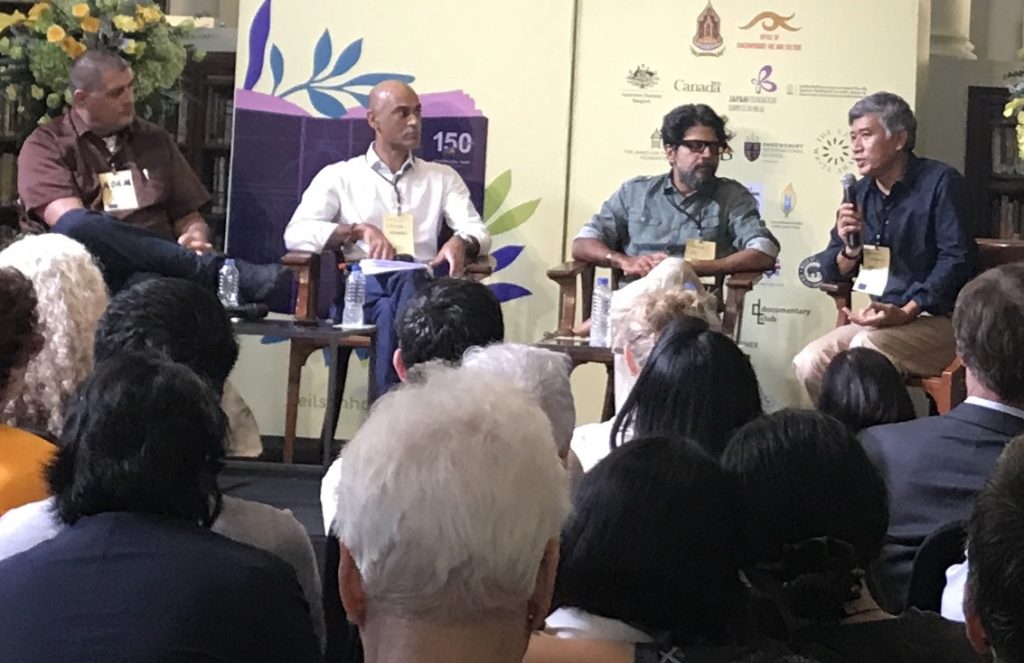
The Opening Panel on “Revolt or Retreat” (from left) Adam Johnson, Nisid Hajari, Pankaj Mishra and Anusorn Tipiyanon. Pix: Imtiaz Muqbil
Adam Johnson, winner of the 2014 Pulitzer Prize for Fiction, said his students face an overload of information and a difficulty to disengage from technology. They are “still processing what the cellphone has done to society. Today, everything and anything can be made public instantly and any person can reveal anything about anyone anonymously.” He said life has become almost superficial, with a perennial shortage of time. Even the thrill and suspense of romance is no longer what it once was.
Revisiting U.S. involvements in global conflicts such as Vietnam, Iraq and Afghanistan, Mr. Johnson warned of the dangers of totalitarianism, citing the examples of North Korea “where books as you know them don’t exist.” He noted that the Koreans had once been occupied by the Japanese who then tried to erase the Korean language. Today, he asked, “What is the value of the written word in an age when the President (of the U.S.) himself does not believe in reading?”
Indian author Pankaj Mishra, who wrote “The Age of Anger: A History of the Present”, said writers are confronted by increasing political chaos. “Let’s face it, the most gripping narratives are found on WhatsApp which is shaping our psyche more decisively than any writer. So how do we write about the world realities? Whether in England or India, you are surrounded by people who are frustrated and angry.”
He said the multiplication and proliferation of narratives can be “bewildering and oppressive, worsened by the need for political correctness and the speed at which the narratives are proliferating.” He added, “Everyone is creator of narratives which they can change at any time. It is an unprecedented situation for the writer.”
Mr. Mishra cited the numerous global protests under way as well as the bitter political polarisation in Britain and the U.S. He called it “the frustration of unmet expectations, unrealised and probably unrealisable desires.”
He added, “More disturbing and potentially volatile is the polarisation in Indian society.” India is on a very dangerous path from which it cannot suddenly retreat. The judiciary, media, bureaucracy and even the military, all of which were once believed to be independent of government, have been subverted and enlisted into supporting an ideological cause.” He cited the recent Supreme Court ruling on the Babri Masjid demolition which he said had effectively rewarded those responsible for an “absolute blatant act of criminality – the demolition of the mosque followed by a nationwide campaign of violence against a minority.”
India is heading for “something that will be more menacing and dangerous than we have ever seen before. Passions are taking precedence over rationality. Smart phones have become a great tool for demagogues who can address their constituents directly without any media intervention which formerly could act as a barrier and at least challenge what was being said.”
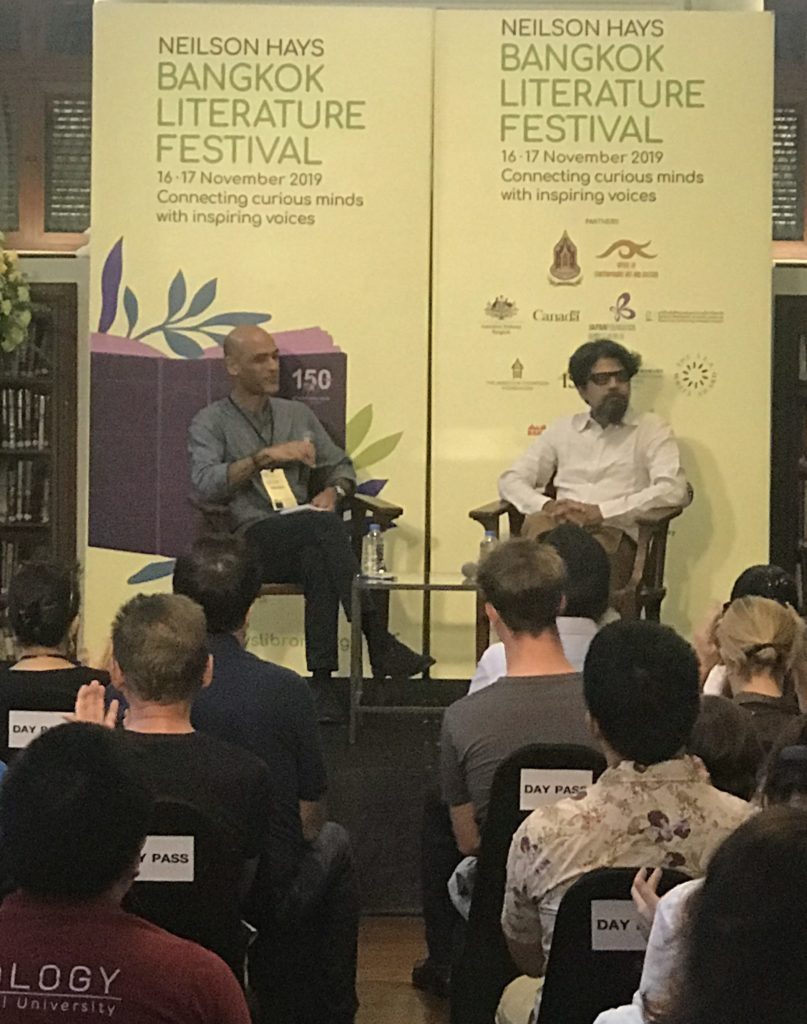
The Age of Anger: Nisid Hajari and Pankaj Mishra. Pix: Imtiaz Muqbil
Now, Mr. Mishra said, the Indian public is “getting information and analysis from dubious sources.” The ruling political party, the BJP, had an overtly anti-Muslim agenda, exemplified by campaigns such as the demonisation of the Mughal emperors who are being portrayed as “bastards and brutes” in a rewrite of Indian history. The message was that India should not be considered as weak before the Muslims and that the Hindus had to regain their dignity and pride. He said it was “very disturbing to see what was once a cult growing into a national movement.”
Thai writer Anusorn Tipiyanon talked about his experiences living in Northeast Thailand, once considered a rural backwater. He said that although Thai people are being ripped off by the mainstream media, it was a good opportunity for real writers to get involved in real issues.
Mr. Anusorn said it’s very difficult to write about what’s going on in Thailand, which is effectively under a democratically elected but militarily-controlled government. In spite of being under self-censorship, he said, writers should not stop trying to put pressure on governments. “This is the best time to go and talk to the people, to try and make their voice louder and louder, to give voice to the other side. Not to attack the structure directly but to ensure that their voices are heard. That is the duty of the writer.”
Similar lines of thought emerged in many of the subsequent sessions.
Burmese writer Dr. Ma Thida discussed how the military had destroyed freedom of expression in her country since the first coup in 1962. The first thing the dictator Gen Ne Win did after the 1962 coup was to amend the publishing act and shutdown all the media. Only two government-owned newspapers were allowed, one English and one Burmese, with all reports having to be submitted to a censorship board. Journalists became a part of the propaganda machinery.
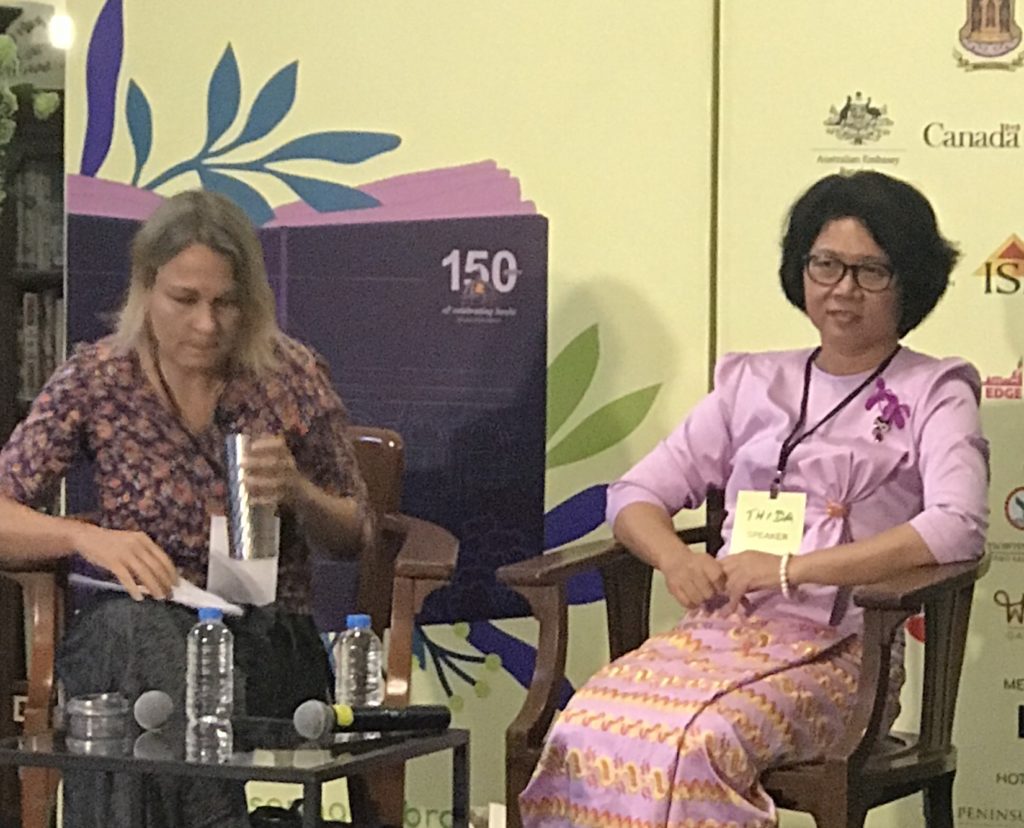
These Freedoms: Dr Ma Thida (right) with Clare Larkin. Pix: Imtiaz Muqbil
She was asked about the Rohingya problem and the criticism of Burmese Nobel Peace Prize winner Aung San Suu Kyi for turning a blind eye to the problem. She said that the Official Secrets Act is still in effect. Also, due to the financial costs and media restrictions, journalists cannot reach the remote areas. Hence, nobody really knows what is going on. She said a proper history of Burma was not written for four decades. Race and religion are still being used to advance political agendas. Social media is rife with conspiracy theories. The mainstream media says all bad things about the U.S. and Middle East and good things about China. “Society has become intellectually blind and incapable of differentiating between right and wrong. And according to their experience, they react emotionally and with violence.”
Indian writer P.Sivakami, the first woman novelist from the Dalit caste, said India has dozens of different castes all but they are united in hatred for Dalits. Violence even breaks out when young people of different castes fall in love and get married without parental approval. This means rapes, murders, suicides and burning of entire villages. There is no justice. Investigative and fact-finding commissions are set up but prove to be a mockery. The Dalits don’t trust the politicians. Instigation by political parties is a major reasons for violence.
She said the hijacking of the media had become a problem in India where “our prime minister is kind of obsessed with the Hindu religion.” She said the scapegoating of Muslims was rampant to divert attention from addressing the harsh realities of life.
Another Thai writer Zakariya Amataya discussed the situation in Southern Thailand. He described Thai “as a colonial language for my culture.” He added, “I know this is the British Club (adjacent to the Neilson Hays library building where some of the panels were held) but the British divided the provinces and states of that region between Malaysia and Thailand.” He said he had grown up studying Thai more than his own language. The young people want to bring back the language which is taught only in the pondoks. This cultural alienation fuels local resentment and animosity. “We are very different. We cannot change our blood or our skin to be another.”

Violence Knows No Borders: (from left) Moderator Cod Sarusayang wth P. Sivakami, Zakaryia Amtaya, Dr Ma Thida and Patrick Winn. Pix: Imtiaz Muqbil
Journalist Patrick Winn said he had made several trips to South Thailand and spoken to the local people about the insurgency. “Their rationale often makes sense. No one thinks they (the insurgents) are the bad guys, even if the rest of the world thinks they are.” Today, the violence continues, as “justice is still elusive” and “the issue of identity remains unresolved.”
One all-women panel focussed on the topic of “Women Uninterrupted”.
P.Sivakami said hundreds of thousands of Indian women are subject to domestic violence and rape. Most are poor, illiterate, Dalit and tribals. Literacy rates differ widely between men and women and beyond between married and unmarred women. Although much has been done after independence to improve women’s rights, such as termination of sati (self-immolation by widows on the funeral pyre of the deceased husband) and curbing of female foeticide, many entrenched Hindu caste system traditions relegating women to subordinate roles in terms of marriage and sexuality remain in place.

Women Interrupted: (from left) Moderator Carina Chotirawe wih Clare Wright, P. Sivakami and Jidanun Luengpiansamut. Pix: Imtiaz Muqbil
History Professor Clare Wright said that in Australia, less than 4% of public memorials and statues are of women. Of that four percent, most are of Queen Victoria and various forms of minx and angels. Australia also has “110 statues of Captain Cook, the man who is claimed to have discovered Australia when in fact he didn’t because the indigenous people were there for 65,000 years before he came along.” She said one woman is killed in her own home per week in Australia. “Are we really a first world nation?” she asked.
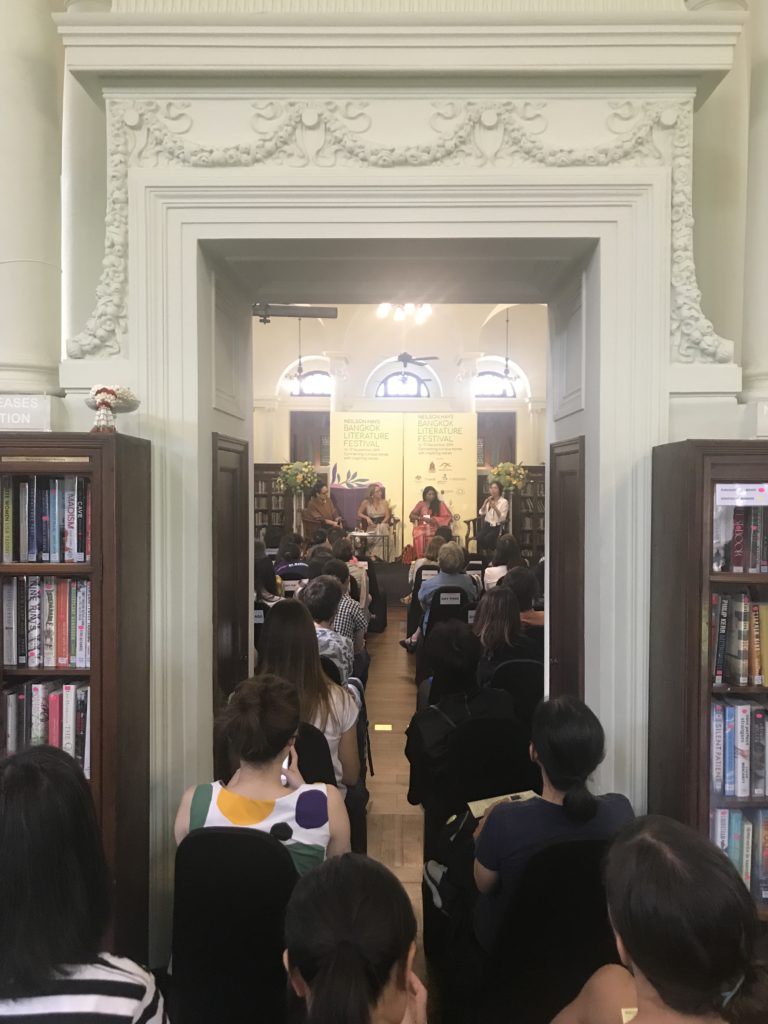
The elegant ambiance of the Neilson Hays library. Pix: Imtiaz Muqbil
S.E.A Write Award winner Jidanun Lueangpiansamut said that although Thai women are now prominent as university students, companies and entrepreneurs, Thailand still remains a male-dominated society. Sexual harassment is rife, with girls often being blamed because of the way they dress.
It was pointed out that 47% of Indian women feel sexual harassment is an issue at work. There are very few women on global corporate boards and the lineup of world leaders. 73% of the titles on the London Review of Books are by men. Only six Thai women writers have won the S.E.A. Write award since its inauguration in 1979, including one woman who won twice.
Many other panels focussed on the creative and business side of the literary world, which this editor was unable to attend due to the overlapping programme. However, interspersed in the discussions of the problems and challenges, there were also solutions.
Clare Wright cited the power of emerging movements. She said she had just come from a huge festival in Melbourne with “two days of unapologetic feminist programming” sparked by the #metoo movement. She described this as being a “third wave” after the suffrage and the “women’s lib”.
Anusorn Tipyanon reiterated the need for giving voice to the voiceless, especially those who were at the bottom rung of the income-levels. Pankaj Mishra said young Indians are wising up to the fact that “leaders are corrupt and incompetent and that we need something new.” This will take time to emerge, via literature that will be much more radical in form and content – unlike the Indian film industry which he said is subject to pressure from its financiers “who are often terrified of political authority.” He said humanity as a whole has to act collectively in confronting these nationalist narratives with fresh thinking and creative ideas.
Adam Johnson called for a simple focus on the value of human life, and for every human being to be seen as a unique character in the storybook of life.
Overall, the Festival was a thoroughly enjoyable and successful event, with plenty of food for thought and soul-searching. Mrs Nalin’s objective to position it as a “celebration of learning and reading not just for a weekend but a lifetime to come” was more than achieved.
Lessons for the Travel & Tourism industry — by Imtiaz Muqbil
The travel and tourism industry is now big on “story-telling”, especially groupings like the Pacific Asia Travel Association (PATA). This festival was a collection of great story-tellers, but in the two days I was there, I didn’t see a single travel industry “story-teller”.
This, in spite of the fact that the entire content was relevant to travel & tourism.
My most important takeaway: It is long overdue for travel and tourism to broaden the definition of sustainability, and give the socio-cultural and geopolitical challenges of Asia equivalent prominence as the environmental challenges — what I have termed “The Other Global Warming.”
Literature has played an historic role in putting many Asian destinations on the map, such as India, China, Thailand, Hong Kong, Singapore, even Burma. Western novelists fictionalised the eras of colonialism and conflict within plots of crime and romance. Their writings created an aura of mystique around Asia and aroused curiosity. Today, the role of literature has changed, and so has travel & tourism. Both can still forge new partnerships in pursuit of new solutions for the Asian Century.
Firstly, travel and tourism forums can give these erudite, alternative-perspective writers, poets and essayists a platform to share their views. Listening to the same old futurists, branding gurus and technobabblers putrefies the mind. Peaceful debate and discussion on global issues is a far greater contributor to mutual understanding and respect, the first step towards achieving badly-needed peaceful solutions.
Secondly, the world of literature and creative arts is under financial pressure. Everyone has bills to pay. Travel & tourism spends/wastes billions of dollars on bloggers and influencers, mostly high-profile sports stars and entertainers. How about extending a lifeline to writers and artists, especially those focussing on broader challenges which are far more important today than just blandly promoting destinations.
That is why I thank all the sponsors of the first Bangkok Literature Festival, especially the Thai Ministry of Culture. The only travel and tourism sponsors were the hotels and airlines who provided the air-tickets and accommodation for the invited foreign speakers. This line-up can certainly be broadened.
The exposure may be small – this first festival was attended by 1,250 people, mostly Thailand residents – but the quality is high. As travel & tourism always brags about seeking quality over quantity, funding such events can help them grow quickly.
A future festival that highlights the role of literature in shaping the image of destinations would be a welcome break from the current crop of intellectually-bankrupt travel industry forums.
In addition to their undisputed economic value, such events enhance the cultural vibrancy of all cities. Bangkok already has a very popular International Festival of Dance and Music, a dedicated Arts and Culture Centre, the Thailand National Cultural Centre and dozens of smaller institutes and galleries. Shopping malls and complexes regularly host cultural events.
Institutionalising them into high-profile annual events for creative, open, peaceful debate and discussion would be a logical step forward.
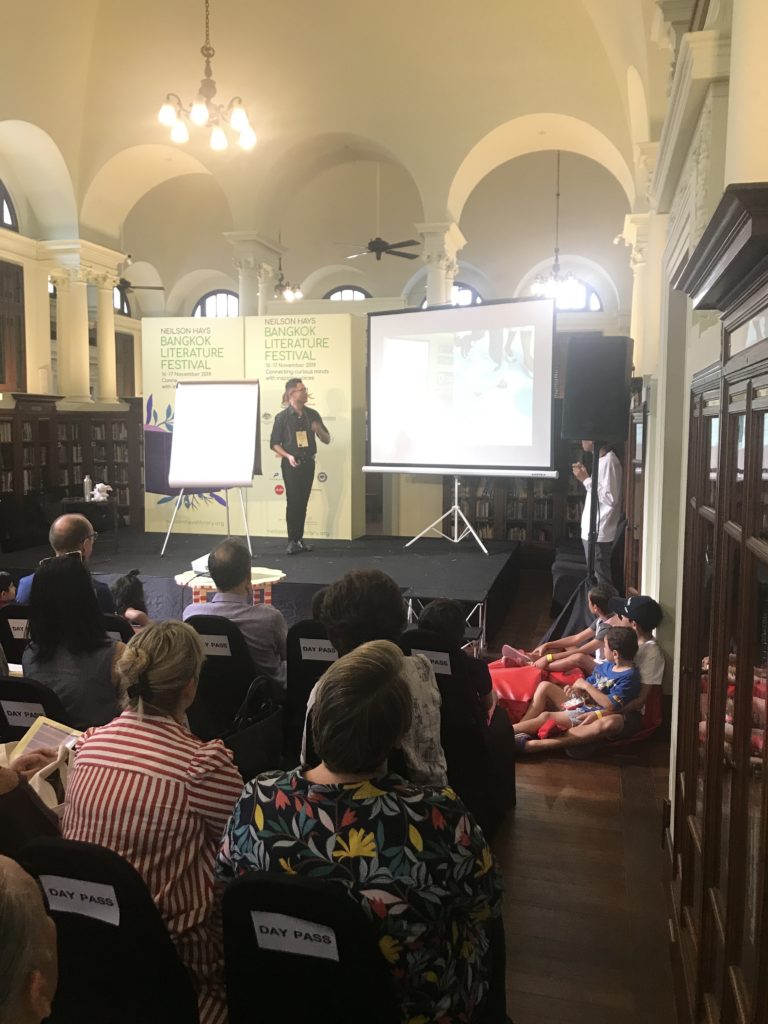 |
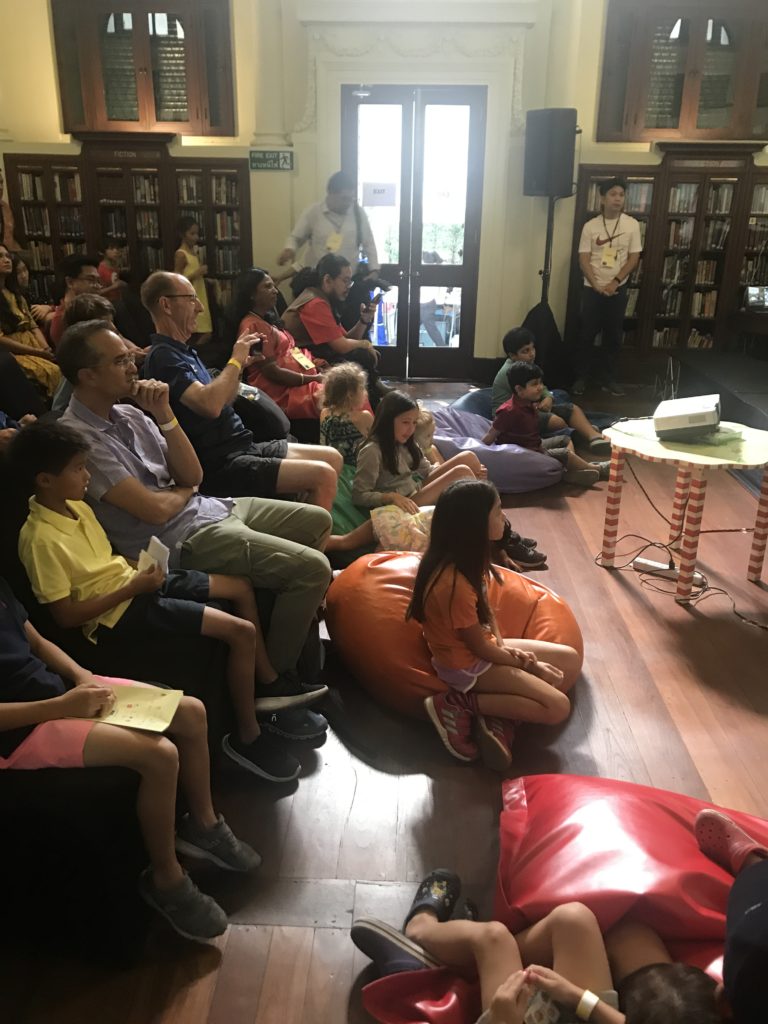 |
|
| Children’s writer Mike Curato giving a live demo of how he draws his cartoon characters. Pix: Imtiaz Muqbil | ||
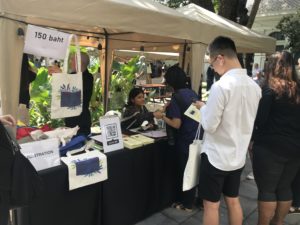 |
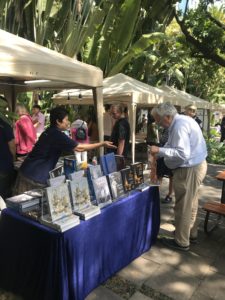 |
|
| Literary exhibits on the Library Grounds with REAL BOOKS!!! Pix: Imtiaz Muqbil | ||
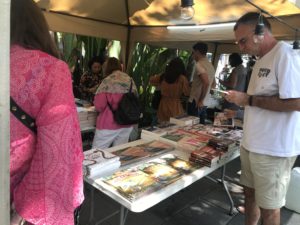 |
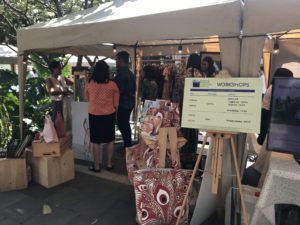 |
|
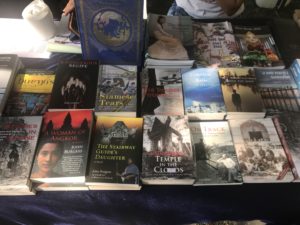 |
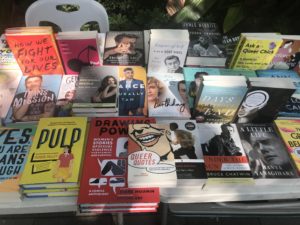 |
|

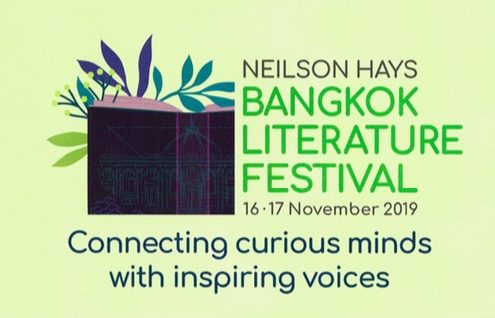


Liked this article? Share it!